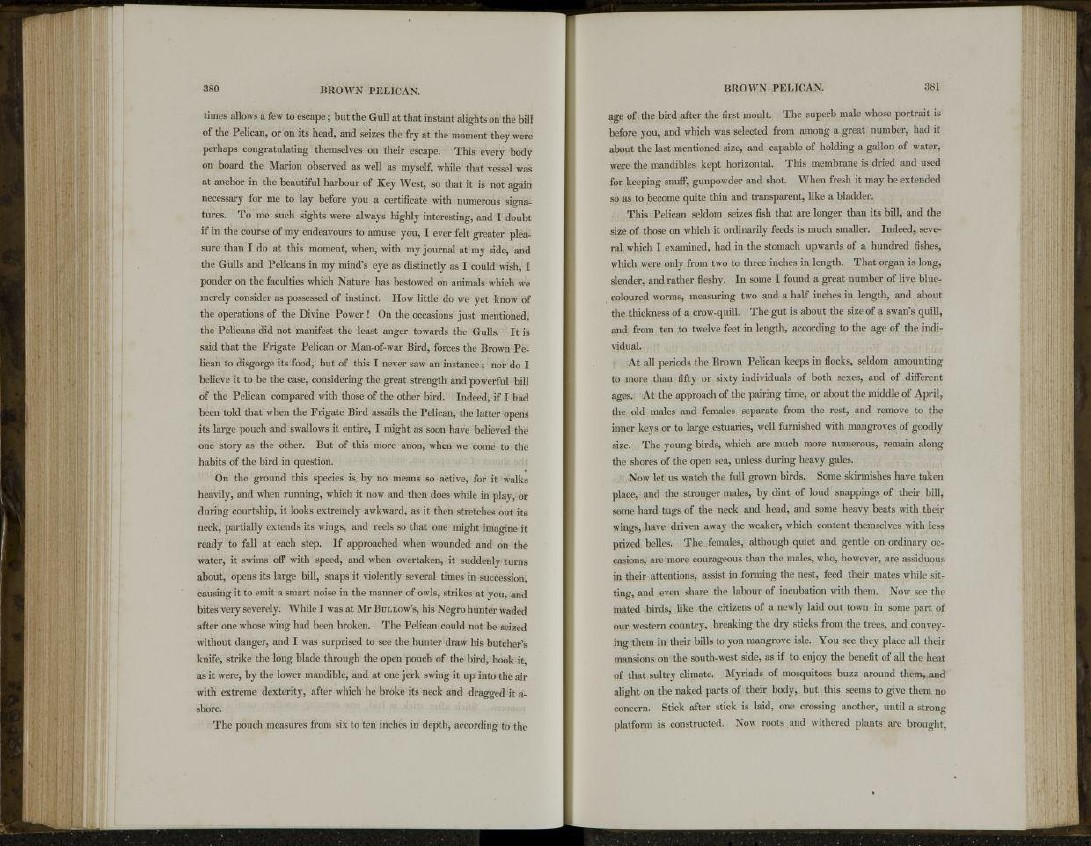
times allows a few to escape; but the Gull at that instant alights on the bill
of the Pelican, or on its head, and seizes the fry at the moment they were
perhaps congratulating themselves on their escape. This every body
on board the Marion observed as well as myself, while that vessel was
at anchor in the beautiful harbour of Key West, so that it is not again
necessary for me to lay before you a certificate with numerous signatures.
To me such sights were always highly interesting, and I doubt
if in the course of my endeavours to amuse you, I ever felt greater pleasure
than I do at this moment, when, with my journal at my side, and
the Gulls and Pelicans in my mind's eye as distinctly as I could wish, I
ponder on the faculties which Nature has bestowed on animals which we
merely consider as possessed of instinct. How little do we yet know of
the operations of the Divine Power ! On the occasions just mentioned,
the Pelicans did not manifest the least anger towards the Gulls. It is
said that the Frigate Pelican or Man-of-war Bird, forces the Brown Pelican
to disgorge its food, but of this I never saw an instance; nor do I
believe it to be the case, considering the great strength and powerful bill
of the Pelican compared with those of the other bird. Indeed, if I had
been told that when the Frigate Bird assails the Pelican, the latter opens
its large pouch and swallows it entire, I might as soon have believed the
one story as the other. But of this more anon, when we come to the
habits of the bird in question.
On the ground this species is, by no means so active, for it walks
heavily, and when running, which it now and then does while in play, or
during courtship, it looks extremely awkward, as it then stretches out its
neck, partially extends its wings, and reels so that one might imagine it
ready to fall at each step. If approached when wounded and on the
water, it swims off with speed, and when overtaken, it suddenly turns
about, opens its large bill, snaps it violently several times in succession,
causing it to emit a smart noise in the manner of owls, strikes at you, and
bites very severely. While I was at Mr BULLOW'S, his Negro hunter waded
after one whose wing had been broken. The Pelican could not be seized
without danger, and I was surprised to see the hunter draw his butcher's
knife, strike the long blade through the open pouch of the bird, hook it,
as it were, by the lower mandible, and at one jerk swing it up into the air
with extreme dexterity, after which he broke its neck and dragged it ashorc.
The pouch measures from six to ten inches in depth, according to the
age of the bird after the first moult. The superb male whose portrait is
before you, and which was selected from among a great number, had it
about the last mentioned size, and capable of holding a gallon of water,
were the mandibles kept horizontal. This membrane is dried and used
for keeping snuff, gunpowder and shot. When fresh it may be extended
so as to become quite thin and transparent, like a bladder.
This Pelican seldom seizes fish that are longer than its bill, and the
size of those on which it ordinarily feeds is much smaller. Indeed, several
which I examined, had in the stomach upwards of a hundred fishes,
which were only from two to three inches in length. That organ is long,
slender, and rather fleshy. In some I found a great number of live bluecoloured
worms, measuring two and a half inches in length, and about
the thickness of a crow-quill. The gut is about the size of a swan's quill,
and from ten to twelve feet in length, according to the age of the individual.
At all periods the Brown Pelican keeps in flocks, seldom amounting
to more than fifty or sixty individuals of both sexes, and of different
ages. At the approach of the pairing time, or about the middle of April,
the old males and females separate from the rest, and remove to the
inner keys or to large estuaries, well furnished with mangroves of goodly
size. The young birds, which are much more numerous, remain along
the shores of the open sea, unless during heavy gales.
Now let us watch the full grown birds. Some skirmishes have taken
place, and the stronger males, by dint of loud snappings of their bill,
some hard tugs of the neck and head, and some heavy beats with their
wings, have driven away the weaker, which content themselves with less
prized belles. The females, although quiet and gentle on ordinary occasions,
are more courageous than the males, who, however, are assiduous
in their attentions, assist in forming the nest, feed their mates while sitting,
and even share the labour of incubation with them. Now see the
mated birds, like the citizens of a newly laid out town in some part of
our western country, breaking the dry sticks from the trees, and convening
them in their bills to yon mangrove isle. You see they place all their
mansions on the south-west side, as if to enjoy the benefit of all the heat
of that sultry climate. Myriads of mosquitoes buzz around them, and
alight on the naked parts of their body, but this seems to give them no
concern. Stick after stick is laid, one crossing another, until a strong
platform is constructed. Now roots and withered plants are brought,